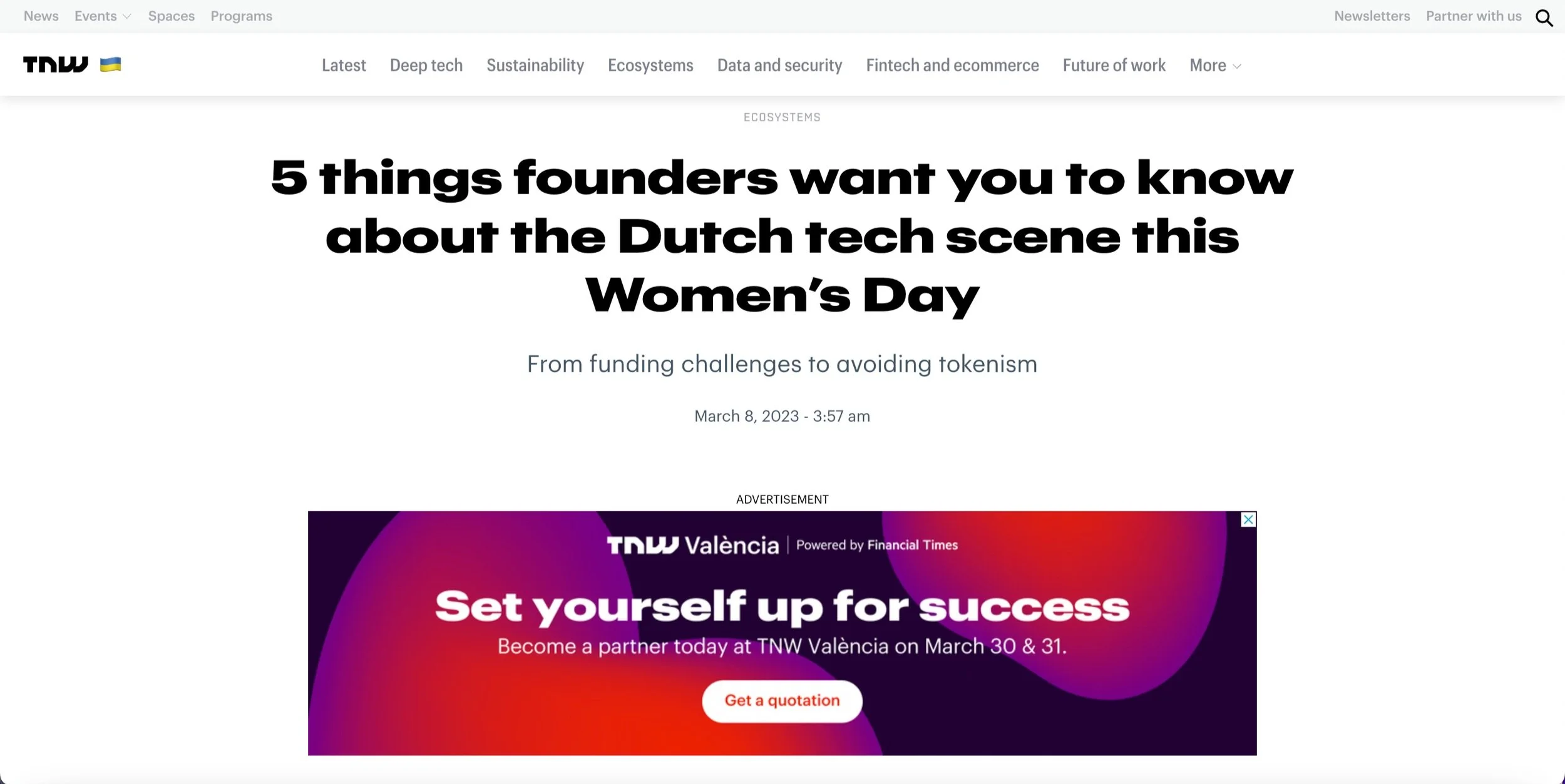5 FOUNDERS ON DUTCH TECH SCENE
Christina Caljé sat down with The Next Web (TNW) editor /writer Andrea Hak to discuss the complicated dynamics of intersectionality in the startup fundraising scene, in the Netherlands.
Backed by the Financial Times, TNW is a technology news company.
Selection from the article:
“We are seeing a strong trend where angel investors are stepping in to plug the funding gap at the early stages” —Christina Caljé
A former Executive Director at Goldman Sachs, Christina Caljé, became a serial entrepreneur successfully launching and scaling several businesses including Autheos, a video-marketing platform, which was acquired in 2021.
With the vast knowledge she acquired in raising capital and breaking into different markets, Caljé has now taken on the VC world serving as an advisor, mentor, and angel investor for pre-seed startups, with a particular focus on investing in women founders and founders of colour. She shared some important insights into the current market that founders should take note of:
The ‘market correction’ in the VC fundraising market has impacted founders throughout the fundraising life cycle, resulting in slower fundraising cycles and normalising of valuations to historical levels. I see these both as healthy dynamics, though, because in actuality the extreme dynamics we saw during the prior 18 months were not setting up founders for success in future fundraising cycles, we are now seeing that play out now with down/flat rounds in the headlines.
Founders onboarded misaligned investors without proper vetting, at too high valuations that necessitated unrealistic milestones in short order to validate appreciated valuations at future fundraises. Moreover, the underperformance of public markets and inflationary dynamics empower investors to employ fear tactics around capital access. In reality, there is still a lot of ‘dry powder’ out there, meaning funds that raised capital in the past 12 months but have yet to deploy it. Founders just need to spend some extra time researching and developing relationships with the right investors for their proposition / vision.
Caljé explained that women founders of colour will have an advantage in this upcoming period because a number of VC funds, angel syndicates, and accelerator programs were launched in the past 18 months in the wake of BLM with a specific mandate to invest in black and brown founders.
I see the fastest and most impactful change coming from the angel investor community. Whether it be via direct investment or syndicated investment vehicles, we are seeing a strong trend where angel investors are stepping in to plug the funding gap at the earliest stages, particularly for gender and ethnically diverse communities. The much sought after ‘fly-wheel’ effect first seen in Silicon Valley is finally reaching this side of the Atlantic; a positive feedback loop in which success breeds a self-sustaining cycle of investment and success!
For all you future founders out there, Caljé shared her top tips on how to successfully fundraise (in any market):
1. Know what you’re looking for from an investor and do your diligence
This is particularly important for earlier stage companies that are still working towards product market fit and commercial traction. Identify those investors (angel or pre/seed venture funds) who understand your sector challenges and timelines, and be clear about what you want them to bring to the table. Is it a network in a target client base? Experience? Geographic access? Product or sector knowledge?
Discuss this upfront and ask for examples of how they’ve delivered such value to their portfolio companies. When considering a lead investor, reach out to their portfolio companies and speak to the founder(s); they’ll most likely give you a candid and honest picture of what it’s like to have that investor on the cap table.
2. It’s not about tailoring the story to the investor, it’s about finding the audience to match your story
As a founder, I understand the frustration when the fundraising process feels long and drawn out because it’s distracting us from what we really want to do — build and grow. But, investing the time in researching potential investors, building relationships and ensuring that you onboard the right investor to match your business needs will bring huge ROI and set you up for success in the longer term. Its importance should not be underestimated.
3. Fundraising is a relay
Once your first fundraise is behind you, you should expect that your investors, whether angel or VC, will provide you with intros to follow-on investors. Many times, we will have preferred funding partners that we ‘pass the baton’ to for the next stage of fundraising. An important thing to realise is that your first investors will set the tone for future fundraises; with each stage, keep in mind how this round will set you up for success in the next round. Remember, it’s a numbers game and you should aim for 50-100+ investor names on your target list.

